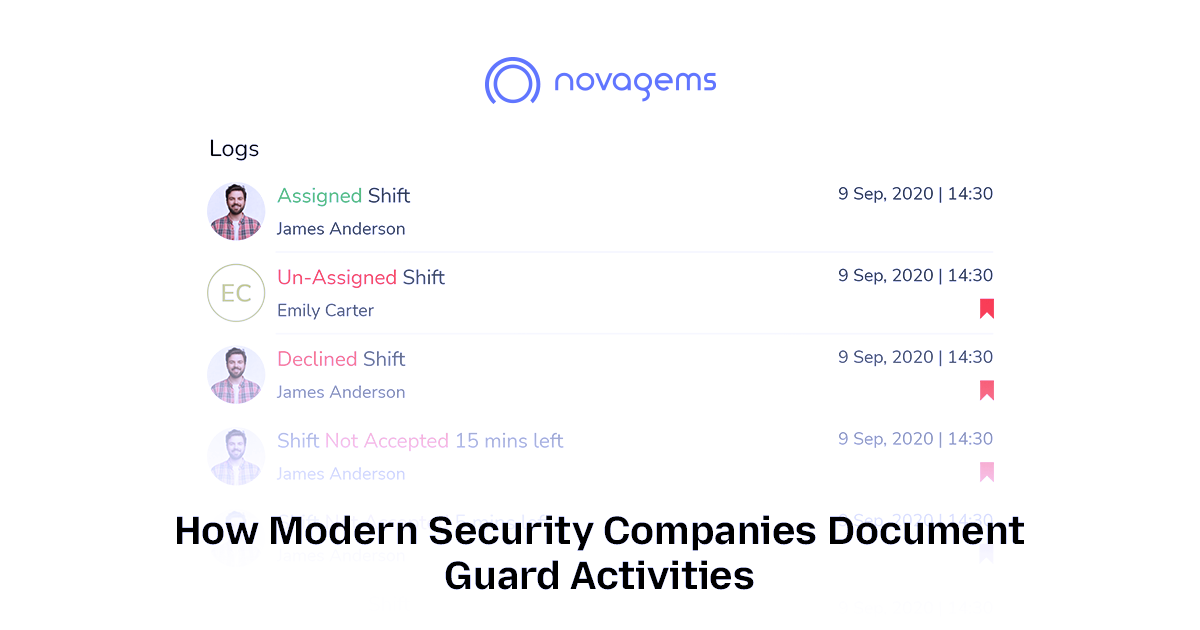How to Reduce Security Guard Callouts: 9 Strategies That Work
Published on: Tue, Nov 4, 2025
Read in 5 minutes

Key Takeaways
- Security guard call outs are one of the biggest operational challenges for security companies in the United States and Canada.
- The reduction of callouts requires accountability and flexibility in proper balance: hiring right, recognizing good performance, and addressing absenteeism early.
- Accordingly, a software-based approach, like Novagems Security Guard Scheduling Software, is more efficient in reducing no-shows by automating schedules, tracking attendance, and sending real-time alerts.
- According to a Gallup workplace study, Work units in the top quartile in employee engagement outperformed bottom-quartile units by 10% on customer ratings, 22% in profitability, and 21% in productivity..
- Here are 9 actionable ways security guard companies are using to minimize callouts, ensure more effective scheduling, and help earn and maintain clients’ trust.
Security guards being called out can paralyze your operations, especially when you are managing a number of sites and stringent client SLAs. Every missed shift translates into finding replacements, incurring extra costs, and, above all, compromising client satisfaction.
Effective management of employee attendance is much more than just filling rosters; it creates a culture of accountability. According to reports, Global employee engagement declined to 21% in 2024, with managers experiencing the largest drop. This marks only the second decline in engagement in the past 12 years — a worrying sign for organizations already struggling with productivity.
Now, let’s review nine time-tested ways to reduce callouts in your security company and make your guards dependable and on duty.
1. Hire the Right Security Guards
The best strategy to avoid excessive callouts is to begin with the right people. Hiring dependable, disciplined, and motivated guards sets the tone for reliability.
While recruiting, look beyond technical skills. Evaluate commitment, communication, and work ethic. Guards who value accountability are less likely to skip their shifts.
How to Do It:
- Use personality or reliability tests at hire.
- Clearly discuss attendance expectations in interviews.
2. Keep Detailed Attendance Records
Tracking attendance manually often leads to missed data and poor insights. By keeping digital attendance records, you can identify which guards have recurring call-outs and when those spikes occur (e.g., weekends or holidays).
This allows for data-driven attendance management, ensuring your guard scheduling remains balanced and fair.
How to Do It:
- Use security guard scheduling software to log shifts, late arrivals, and absences automatically.
- Analyze monthly reports to detect trends.
- Implement attendance KPIs as part of performance reviews.
3. Address Callouts Quickly
Delaying response to absenteeism allows the issue to snowball. The instant a guard misses a shift, contact them to understand why. Some absences may be genuine, while others could signal disengagement or burnout.
How to Do It:
- Assign a manager/supervisor to follow up on every missed shift within 24 hours.
- Give support when there are legitimate issues, yet be firm with repeat offenders.
- Keep written documentation for every call-out and discussion.
4. Recognize and Reward Good Performance
Recognition fuels reliability. Guards who feel appreciated for showing up are more motivated to maintain good attendance.
Companies that regularly recognize employees, a SHRM report states, experience 31 percent less absenteeism and higher levels of productivity.
How to Do It:
- Offer monthly rewards for “Perfect Attendance” or “On-Time Guard”.
- Give public shoutouts during team briefings or through newsletters.
- Offer small incentives, like gift cards or paid breaks, for perfect attendance.
5. Permit Guards to Make Up Missed Shifts
Flexibility reduces friction. Life happens, so when guards occasionally call out, giving them a fair way to make up their missed shift can reduce guilt and maintain morale.
It’s about being empathetic, yet accountable.
How to Do It:
- Allow shift swaps via your scheduling platform.
- Maintain an “on-call” list of guards who can fill unexpected absences.
- Document makeup shifts to ensure fair scheduling practices.
6. Lead by Example as a Manager
Managers set the company culture. If managers meet their schedules and arrive on time, and if staffing problems are addressed promptly, then guards are more likely to demonstrate the same behavior.
- Maintain regular on-site or virtual presence.
- Follow the same attendance rules you expect from your team.
- Encourage open communication and lead with integrity.
7. Set Clear Expectations for Attendance
Clarity eliminates confusion. A lot of callouts take place because security guards don’t fully understand attendance rules or consequences.
Setting policies from day one ensures everyone knows what is expected.
How to Do It:
- Remind staff about policies at regular meetings.
- Display attendance protocols digitally in your guard management portal.
8. Route All Callouts Through a Manager
Having one manager handle all callouts creates consistency and accountability. It eliminates miscommunication between supervisors, making sure that absences are documented accurately.
How to Do It:
- Require guards to report callouts directly via phone or app to their shift manager.
- Log every callout in your attendance management system.
- Standardize responses for approved vs. unapproved absences so the guards understand the consequences.
9. Follow Up After Employee Absences
A simple follow-up call after an absence can reveal deeper-lying issues, such as schedule conflicts, transportation problems, or burnout.
Showing that you care about the well-being of your guards encourages honesty and reduces future callouts.
How to Do It:
- Check in personally or through HR after each absence.
- Offer resources or flexible options if the problem is recurring.
- Document follow-ups for transparency and pattern tracking.
- Attendance Tracking Made Easy Using Novagems Software
All these strategies work best when supported by reliable technology. Novagems Security Guard Scheduling Software will help security companies streamline the management of shifts, track attendance, and monitor call-outs-all on one single platform.
Managers can instantly identify no-shows through real-time dashboards, GPS verification, and automated notifications, and make shift changes before the client may even know a gap existed.
This level of automation not only lessens the administrative workload but also minimizes errors, thereby ensuring accountability across all sites.
Conclusion
Those security companies that focus on attendance management will set themselves apart in reliability and service quality. Reduced callouts equate to fewer scheduling crises, happier clients, and a more motivated workforce. Apply these nine strategies and use technology such as Novagems to develop a proactive, reliable, and effective guard force that shows up every time.
Get a Free Trial
Sign up For Newsletter
Latest Blog Posts
Get Started
Start being productive & grow your business
with Novagems





